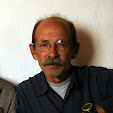A
friend had just introduced me to Nevzat * and the three of us were sitting in front of
his shop having a tea. His thick black eyebrows
were well paired with his dark and kind eyes.
I was told that Nevzat was Yezidi and I was keenly interested to learn
his story.
“And you are Yezidi?” I asked. Nevzat smiled. From around his neck and under his shirt he pulled out a silver Zoroastrian symbol adopted by some Yezidis as a mark of their religion. He looked around and suggested that we needed to be more discreet in saying the word “Yezidi,” a warning he repeated over the following days.
“And you are Yezidi?” I asked. Nevzat smiled. From around his neck and under his shirt he pulled out a silver Zoroastrian symbol adopted by some Yezidis as a mark of their religion. He looked around and suggested that we needed to be more discreet in saying the word “Yezidi,” a warning he repeated over the following days.
I
was once again in southeastern Turkey, stopping by for a few days on
my way home from Iraqi Kurdistan.
.........................................................
The fate of the Yezidis in
Turkey was sealed 30 years ago when they were caught between the hammer and the anvil of the Kurdish separatist guerillas and the Turkish military. Almost the entire Yezidi population of 30,000,
already greatly diminished, emigrated to Europe.
Some
emigrants such as Ibrahim, have recently begun to return to their villages for
the summer months. (see November 2009
entry in this blogsite).
And
still others like Mezdar stayed in Turkey his family having become Muslim.
The
majority who left Turkey, however, have found their new lives elsewhere, like Ahmut and
his family in Germany.
..............................................................
And
then there is 35-year old Nevzat, a Kurd raised as a Muslim, seeking the
religion of his father’s father.
His
grandfather was Yezidi who became Muslim.
Although Nevzat didn't know the circumstances, the “acceptance” of Islam
would have been an act of survival in an overwhelming Muslim environment. Nevzat was raised Muslim, but around the time
of his grandfather’s death in the mid-1990s he became curious about the
Yezidi religion. There were clues he remembers
from his grandfather, Nevzat said although he was not specific. (I imagined the grandfather secretly lighting candles on Wednesday and Friday nights, much like the stories of New Mexico’s Crypto Jews lighting candles in their
homes on the Jewish Sabbath.)
Eventually
Nevzat discussed his interest in Yezidi’ism with his father, a respected Muslim
Kurd. It was a practical, not a
spiritual discussion, he said. His
father was concerned about the reprisal of discrimination - if not persecution
- by the Muslim Kurdish community, should the family’s Yezidi heritage become
known. Following his father’s advice, Nevzat
has proceeded with discretion over the years.
He
studied my photographs of Yezidi temples, shrines, and friends; and, listened
intently as I passed on some of what I had learned and experienced over the
years.
The
night before leaving, I showed him the two talismans I keep with me
during my travels: A St. Christopher’s
medal given to me by my mother: and, a plain silver ring given to me in 2010 by
a young impoverished Yezidi sheikh working in a rundown hotel in Iraq. Nevzat studied them intently.
Without
a word he went into his shop. Soon he emerged,
holding his fisted right hand to his chest.
He hesitated a moment before sitting down next to me and then slowly
opened his hand to reveal a pebble-sized piece of polished jade. I looked at it and then at him.
“This is for you, Robert,” he said. “My grandfather gave it to me just before he died 20 years ago. He told me that someday I will meet someone who my heart will tell me I must give it to. I give it to you.”
After
a long pause of warm silence, I feebly tried to refuse the gift. I knew what the outcome of the attempt would be.
I
put the jade, ring, and medal into the small pouch, which with certain
attention, I put into my shirt pocket over my heart. We nodded and had another glass of amber tea.
(*
All names have been changed; identifying details have been omitted or altered.)










Thank you for sharing these stories and beautiful photographs. Be safe.
ReplyDeleteThank you so much my friend for telling the world our stories.
ReplyDeleteFathel